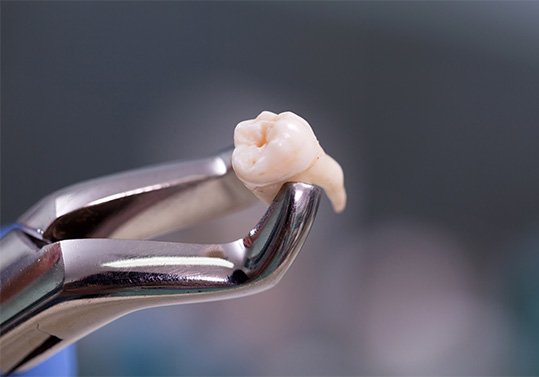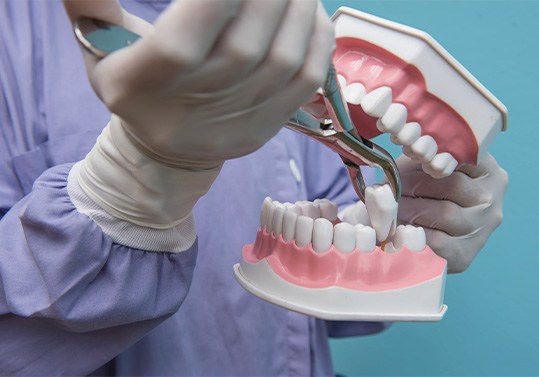Tooth Extractions Huntington Beach, CA
Protect Your Mouth with a Necessary Tooth Extraction
A damaged tooth can be painful and unsightly, but sometimes despite your dentist’s best efforts, it is not possible to repair it. In these situations, your dentist will recommend a tooth extraction. This procedure completely removes the damaged tooth from your jaw, protecting your healthy teeth and gums from the risk of further damage from decay or infection. Tooth extraction often relieves pain, and solutions are available to close any gaps left behind once healing is complete.

Why Choose Elite Dental of Fountain Valley for Tooth Extractions?
- Skilled, Trustworthy Dentists
- Wisdom Teeth Removal
- Emergency Appointments Available
Reasons Why Tooth Extractions Are Necessary

There are many reasons besides a toothache why your dentist may recommend a tooth extraction, some of them urgent, some of them not. These reasons can include:
- Severe damage or tooth decay
- Creation of space during orthodontic treatment
- Successful placement of a denture
- Stubborn baby tooth that will not fall out on it own
- Impacted wisdom tooth
Furthermore, if you have an infected tooth, your dentist’s priority is to protect your remaining healthy teeth. Thus, to stop the spread of infection from causing more damage and risking the health of more of your teeth, removing the infected tooth may be necessary.
The Process of Removing a Tooth

The tooth removal process is quite safe and efficient. First, your dentist will numb the area of the tooth needing extraction. Once the mouth is sufficiently numbed, your dentist will then use a tool called an elevator to lift the tooth out of its socket, making it easier to remove. They will then use a pair of forceps to grasp the tooth, gently wiggling it free from any connective tissue.
Once the tooth has been removed from the jaw, your dentist will close the area with a suture. Often, they can use dissolving sutures that do not need to be removed and will vanish within about a week.
If necessary, your dentist will discuss tooth replacement options with you prior to your procedure so that you can begin the process of restoring your smile as your mouth heals from the extraction. It is important to have a plan in place for this stage, as replacing your extracted tooth will help protect your remaining teeth from damage or misalignment.
Tooth Extraction Aftercare

After your tooth extraction procedure, following the aftercare instructions is imperative to ensure proper healing. Here are some tips for a speedy recovery:
- Take your painkillers only as prescribed.
- Leave the gauze placed in your mouth by your dentist in position for at least 3 to 4 hours after your procedure.
- Apply ice to your face just outside the affected area immediately following the extraction in 10-minute intervals.
- Get plenty of rest for the first 24 hours post procedure and limit physical activity for 2-3 days.
- Do not rinse or spit for at least 24 hours after the procedure.
- Do not use a straw for at least 2-3 days.
- You may rinse with a salt solution 24 hours after the procedure. Mix a half teaspoon of salt with 8 oz of water and carefully swish for 10 seconds before gently spitting it out.
- Do not smoke.
- Sleep with your head elevated.
- Brush and floss your teeth but avoid the extraction site.
- Follow up with your dentist for tooth replacement options.
Understanding the Cost of Tooth Extractions

It can be surprising to learn that you need a tooth extraction, and it’s understandable that you’d be interested in knowing about the cost of having one. If we determine that tooth extraction is the best way to preserve your oral health, we’ll thoroughly explain the associated costs so you can know exactly what you can expect to pay. Here’s a basic outline of how tooth extractions are priced at our office in Fountain Valley.
Factors That Can Affect Tooth Extraction Cost

While we cannot offer you a proper cost estimate for your tooth extraction until Dr. Saber or Dr. Shah has evaluated you at your consultation, there are a few factors that largely determine the overall price. These include:
- The type of tooth being extracted/where it is located: Teeth that are farther back in the mouth have more roots and more complex anatomy, making them more difficult and costly to remove.
- The complexity of the extraction: Simple extractions are less costly than the surgical extractions necessary for more complicated cases such as impacted wisdom teeth.
- The cost of tooth replacement: The American Dental Association recommends replacing lost teeth as soon as possible, and the cost of the restoration will be included in the final bill. We offer options such as dentures, dental bridges, and dental implants as well as preliminary procedures that may be necessary like sinus lifts, bone grafts, and gum disease therapy.
Does Dental Insurance Cover Tooth Extractions?

Dental insurance often covers tooth extractions at about 50% after the deductible has been met, and this includes wisdom teeth. However, your plan may include limitations such as only covering a particular number of extractions every year or coverage starting after a specific date. Since every policy is different, we’ll be happy to help you confirm what your insurance provider will pay for before you commit to treatment.
How to Make Tooth Extractions Affordable

We understand that many patients who need tooth extractions may be uninsured or underinsured. To ensure that these individuals can get the dental care they need, we offer:
- Financing Options: We partner with trusted third-party financiers such as CareCredit, Lending Point, and Sunbit to offer patients flexible payment plans that can break their bills into easy monthly installments with little or no interest.
- Elite Smile Club: For a one-time activation fee and a low monthly payment, we offer patients two routine cleanings and exams and one emergency exam per year as well as fluoride treatment, necessary X-rays, and 15% off all other treatments with some exclusions.
Our team will be happy to help you navigate your insurance policy as well as your financing and payment options, so please reach out to our office if you need assistance.
Tooth Extractions FAQs
Does Getting a Tooth Extracted Hurt?
It’s understandable to be worried about tooth extraction pain. After all, we’ll be removing something that’s generally considered to be one of the strongest substances in the human body! Rest assured, your tooth extraction in Fountain Valley won’t be as traumatic as TV makes them out to be. The very first thing we’ll do before starting your treatment is numb your mouth with a local anesthetic. Plus, our office has nitrous oxide sedation, which can further dull your senses and help you feel more at ease if you’re nervous.
What’s the Difference Between Tooth Extractions and Wisdom Tooth Surgery?
The main difference is the type of tooth being removed during each treatment. A wisdom tooth extraction involves the third molars that typically grow in between the ages of 17 and 25. A general tooth extraction can refer to any other tooth in a dental line up.
Dentists tend to distinguish between these two treatments because wisdom teeth often become impacted (trapped below the gumline) and require surgical removal. Think of it as a sort of shorthand that helps your dental team determine your extraction needs.
What Are My Options for Replacing a Missing Tooth?
You have quite a few options for replacing missing teeth in Fountain Valley. Here’s a simplified explanation of how we can restore your smile after extraction:
- With a dental bridge: Best for patients missing one or more teeth in a consecutive row.
- Full or partial dentures: Full dentures can replace an entire arch of teeth, while partials are better for scattered dental gaps.
- Dental implants: These can be attached to a crown, bridge, or denture, meaning they can effectively replace any number of missing teeth in a variety of configurations.
If you’re not sure which restoration would be best for your smile, don’t worry. We’ll be happy to help you choose!
Can I Smoke After Getting a Tooth Extracted?
No. The problem with tobacco products is that they contain chemicals that can interfere with the healing process and increase your risk of infection. To avoid potential complications, we strongly recommend that patients avoid smoking for at least five days after their tooth extraction (though if you can quit for two weeks, that’s preferred).
Rest assured, our goal isn’t to judge your smoking habits. We simply want you to have a smooth recovery. If you think quitting will be challenging, please don’t hesitate to let us know. Our team can help you prepare so that the transition is a little easier!
